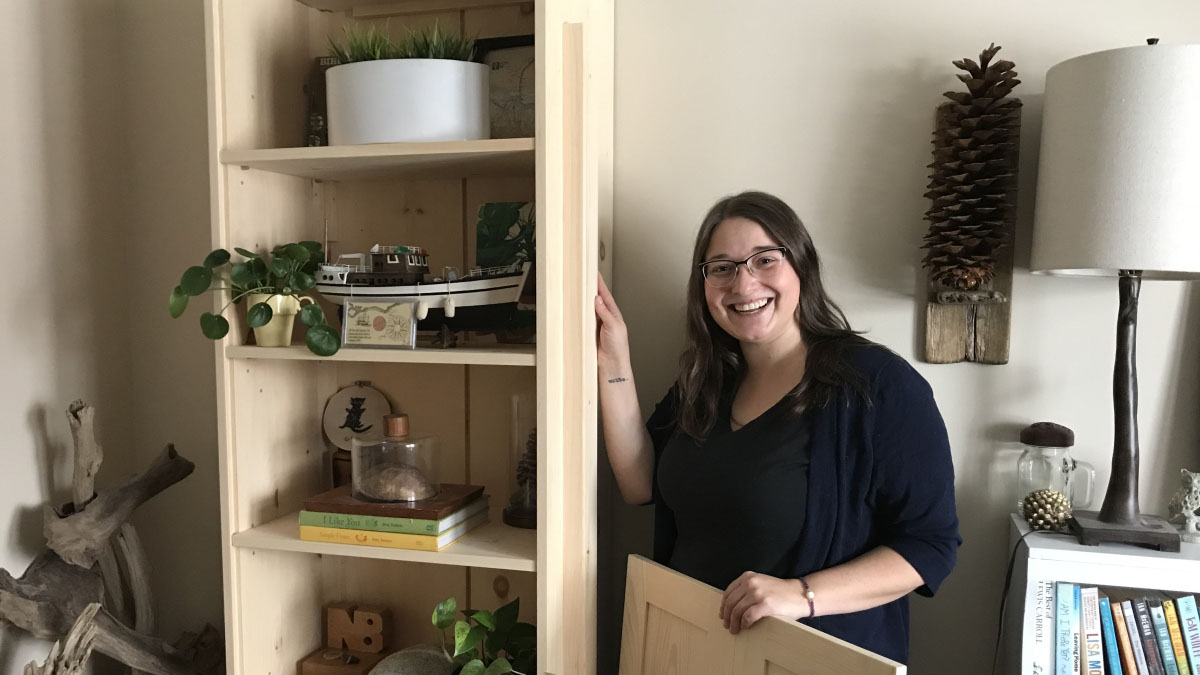DIY before you die: From bookshelf to coffin
How a Maritimer is embracing mortality with a bookshelf

caption
Jessica Newman and her new bookshelf casket.If you wander into Jessica Newman’s guest room, you’ll see a chair, some potted plants, and an unremarkable wooden bookshelf. One day, she’ll be buried in it.
“You put things on those shelves that are your favourite and then you can be buried in something that you know once contained your favourite things,” she says.
“I get comfort from knowing what I’ll be buried in.”
Newman, 35, has always known she wants to be buried when she dies. When she attended a networking event for local entrepreneurs in her hometown of Fredericton and met Jeremy Burrill, owner of Fiddlehead Caskets, she knew she had found her casket maker of choice.
Despite being in “perfectly good” health, the idea of having a reminder of her mortality in her home resonated with her.
“The more you can make peace with it early on, knowing that it’s a for sure thing, the more you can live your own life,” Newman says.
For the past two years, Burrill has offered a build-it-yourself casket kit through his Fredericton-based business. His website allows buyers to order and assemble their own coffins. The kits retail for around $860, and come complete with everything needed, down to the hammer. This is half the base price of traditional caskets.
Newman had originally planned to buy and assemble one of the regular do-it-yourself caskets. Her partner, Brad, who shares her home, wasn’t thrilled. So she opted for a version with five removable shelves that doubles as a bookshelf. It cost a little more, but it was exactly the compromise she was looking for.
Demand-wise, Burrill says “it’s been pretty decent.” He says he’s sold just under 50 of the regular do-it-yourself caskets in the two years he’s offered them. Two of the bookshelf-option caskets were bought before the official launch on the website earlier this month.
Newman takes comfort in knowing that her family won’t have to pay for or worry about this aspect of her funeral when she dies.
She also likes the eco-friendly aspect of the caskets, which are made with 100 per cent white pine, and require no glue or metal. Burrill says it’s best to check with individual cemeteries on what types of caskets they accept.
Steve Mannell, director of the College of Sustainability at Dalhousie University, says an eco-friendly funeral comes down to more than just a casket choice.
He points out that although the white pine caskets offered by Burrill have less of an environmental impact than more traditional lead-lined ones made from exotic imported wood, burial overall is not particularly sustainable.
In a perfect world, Mannell says, simply laying bodies out in a field would be the most eco-friendly option. This isn’t a viable choice for most people, for obvious reasons.
“It’s part of the problem with sustainability in general, there isn’t an easy answer,” he says.
But Newman is happy with her choice. For now, her future casket sits in her guest room, with unsuspecting house guests none the wiser.
“It smells amazing,” she says with a laugh.
About the author

Abigail Trevino
Abigail is a fourth year journalism student at the University of King's College. She is also the publisher of The Watch, the university's campus...
